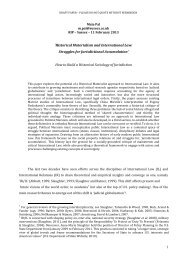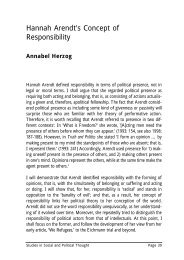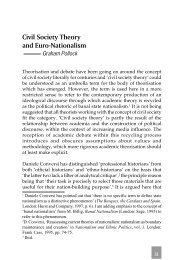Just a Matter of Choice? Student Mobility as - University of Sussex
Just a Matter of Choice? Student Mobility as - University of Sussex
Just a Matter of Choice? Student Mobility as - University of Sussex
You also want an ePaper? Increase the reach of your titles
YUMPU automatically turns print PDFs into web optimized ePapers that Google loves.
<strong>of</strong> where to realise her idea <strong>of</strong> a vocational<br />
future:<br />
Erm, I think it all began – I can‟t exactly<br />
remember when it w<strong>as</strong> – when we did a<br />
test at the job centre, on what I w<strong>as</strong><br />
interested in, because I didn‟t really<br />
know in which direction I should go.<br />
One <strong>of</strong> the results w<strong>as</strong> physiotherapy<br />
and I had two families here in Bielefeld<br />
for whom I babysat. One family came<br />
from Holland and were<br />
physiotherapists, and the other had a<br />
brother who w<strong>as</strong> physiotherapist. And I<br />
spoke with them both, I think, and the<br />
Dutch family said: If that‟s what you<br />
plan to do, then you should definitely go<br />
to Holland. (Anja)<br />
Another example <strong>of</strong> how others play an<br />
important part in bringing about student<br />
mobility is provided by Andrea who reflects<br />
on the role <strong>of</strong> her older sister (who had<br />
been in the UK for an exchange year<br />
herself) in making her study in the UK:<br />
Yes... she just said quite bluntly:<br />
„Andrea, go and study in England, that‟s<br />
the best thing for you‟ [laughs]. Not that<br />
I absolutely had to do it, or anything like<br />
that, but she w<strong>as</strong>… she always<br />
managed to find things out, like: „Come<br />
on, Plymouth would suit you! Or<br />
Portsmouth, I‟ll even come and visit<br />
you‟. That‟s just the way she h<strong>as</strong> always<br />
done it, dropping hints and showing me<br />
the options... or at le<strong>as</strong>t drawing my<br />
attention to the fact that these<br />
opportunities exist or that this would be<br />
a good way <strong>of</strong> doing it. (Andrea)<br />
In these kinds <strong>of</strong> stories, the „other people‟<br />
are <strong>as</strong>signed the role <strong>of</strong> „information<br />
brokers‟ whose help made the respondents<br />
aware <strong>of</strong> specific opportunities which were<br />
hitherto unnoticed or simply unknown to<br />
them. In those c<strong>as</strong>es – like Sandra‟s, Anja‟s<br />
and Andrea‟s – where studying abroad<br />
started right after the Abitur (the German<br />
equivalent to A-levels), this move w<strong>as</strong> most<br />
<strong>of</strong>ten influenced by someone from the<br />
personal milieu. But similar encounters,<br />
albeit in a more institutional setting, are<br />
also recounted by those respondents who<br />
went abroad after having first studied at a<br />
German university for some time<br />
(sometimes with, sometimes without,<br />
graduating there first):<br />
I got some advice from the ERASMUS<br />
<strong>of</strong>ficer […]. And... well, she <strong>as</strong>ked me:<br />
What do you want to do for your main<br />
degree, what do you want to specialise<br />
in? And by then I knew that I wanted to<br />
do something with environmental<br />
issues […]. And then she said: Well…<br />
the UK etc... we‟ve got something much<br />
better, apply to Denmark, they have an<br />
English-language M<strong>as</strong>ters on <strong>of</strong>fer that<br />
concentrates predominantly on<br />
environmental issues. […] One <strong>of</strong> our<br />
lecturers had worked there <strong>as</strong> visiting<br />
lecturer […] and he said: Yes, go for it,<br />
[…] I can highly recommend it. (Martin)<br />
<strong>Just</strong> like Martin, many other respondents,<br />
whose educational mobility started,<br />
comparatively speaking, later than that <strong>of</strong><br />
the first group, recall encounters with<br />
university lecturers, exchange programme<br />
managers or other students <strong>as</strong> an<br />
important step in the process through<br />
which they finally ended up graduating from<br />
a foreign university. Often though, neither<br />
the respondents nor the persons they<br />
talked to necessarily intended this from the<br />
very beginning. Martin, for example, initially<br />
went to Roskilde <strong>as</strong> an ERASMUS student,<br />
but enjoyed the Danish academic system so<br />
much that he decided to graduate there<br />
instead <strong>of</strong> returning to Germany (the same<br />
happened to Lisa who stayed in Sweden,<br />
finishing an MA course there). A similar<br />
change <strong>of</strong> thought is recounted by Petra<br />
who does not refer to another person, but<br />
whose trajectory w<strong>as</strong> also influenced by<br />
existing institutional affiliations between<br />
her university and a British one:<br />
[…] and then I managed to find out<br />
somehow that the FU [Freie Universität<br />
Berlin] had a kind <strong>of</strong> exchange<br />
programme with the LSE, where you<br />
could study for a year and then come<br />
back, and I had applied but not got the<br />
place. […] but during the whole process<br />
10

















